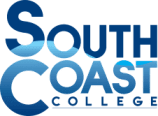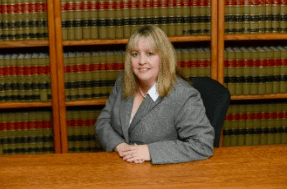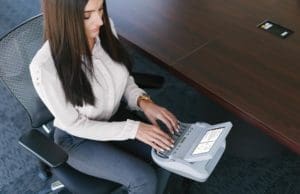We had the pleasure of interviewing a South Coast College Alumna Court Reporter, Cassandra Caldarella. Read the following interview below to learn more about Cassandra and her experience as a professional Freelance Court Reporter.
Cassandra Caldarella
- Freelance Court Reporter Member since: 2006.
- Currently resides in: Santa Ana, CA
- Graduated from: South Coast College (Court Reporting Program)
- Theory: Robert-Walsh-Gonzalez
SCC | How did you learn about the career?
CALDARELLA | At a child’s birthday party! LOL! I was at my best friend’s son’s 5th birthday party, and I just happened to sit next to one of her neighbors, eating cake. We started talking about what we do for a living and she told me she was a court reporter.
Having never heard of that profession, at first I thought she was talking about a journalist who covers court stories, then I thought it was something like secretarial work. Years later, I was looking for a career change, and I was about to enroll in law school. My best friend told me to consider court reporting, but I didn’t think they made a lot of money. My friend corrected me and told me her neighbor that I met makes a lot of money.
So I consulted the experts, Google, and made an appointment to visit my closest court reporting school the next day. Within 24 hours of conceiving the idea of court reporting as a career, I was enrolled in school.
A career in court reporting offered everything I was looking for: an opportunity to make over six figures, own my own business, set my own schedule, be in the legal field, and break that glass ceiling!
SCC | What has been your best work experience?
CALDARELLA | I had the opportunity to accept an assignment as a civil trial reporter in Los Angeles Superior Court doing a 5-week medmal case with 5 neuroradiologist doctor defendants working with 5 of the world’s top defense attorneys and a famous plaintiff’s attorney, but for a judge whom everyone else was afraid to work.
Three previous reporters quit. Never one to back down from a challenge, I hurled myself into a world of extremely challenging medical terminology, stacked with the world’s top medical experts, doing roughs, daily transcripts, and realtime output to the judge and 5 attorneys.
At the end of the trial, the judge expressed how impressed she was with my realtime and said she’d be happy to have me back as a reporter in her courtroom any time. That opened the door to many more trials in her courtroom, and I hear she brags about me all the time.
Also, at the end of the trial, the agency invited me to a really fancy and expensive dinner to celebrate because it was their highest grossing job ever!
SCC | What was your biggest hurdle?
CALDARELLA | You would think my last answer would cover this, but I’ve had a bigger hurdle. I covered a lot of asbestos hearings and trials in Los Angeles Superior Court in one of the State’s few asbestos courtrooms. The judge would regularly schedule plaintiff’s hearings all on one day, where all of that plaintiff’s cases would be discussed, which meant that all of the defense attorneys for all of those cases would be present.
I was fortunate to have six different agencies hire me for six of the separate matters all heard on the one day, and then get copy orders from all of the other defendants on those cases, which was a huge paycheck for just one short day of this plaintiff’s hearings. But it made for the most challenging court reporter assignment of my career.
The entire audience was filled with defense attorneys with attorneys spilling into the isles and back row all standing up, then the jury box was full, and there were four tables with four chairs each full of attorneys, with more attorneys standing next to the desk, and then there were 40 attorneys on court call on the phone.
Trying to identify all of those attorneys, as you can imagine, was difficult. But the fact that they were all moving around the room as their cases were called, or they interjected on someone else’s case, and with the judge constantly interrupting the attorneys, was the biggest hurdle of my career!
Fortunately, I knew most of the attorneys because I had done nothing but asbestos trials with them for a while so I had created briefs for all of their speaker ID’s and I was able to identify them for the record easily. I also collected business cards at the start of the day and had written identifiers on their cards such as “blonde/blonde,” “glasses/glasses,” “blue/blue” for a blue tie, etc. Then another blonde would show up, so I would write “long/long,” for the longer length hair. And another blue tie would show up, so I’d write “stripe/stripe” for the different pattern.
I’d get really creative as similar identifiers would show up. Then I’d staple all of their business cards on the worksheet for that case, and then set all the paperwork in front of me. I used my 9 speaker ID’s first and put their names in my software so they were translated, then I entered all the double stroke words with those attorneys’ names as speaker ID’s.
If I forgot who it was when they started speaking, I’d use my Juror ID and write what they said while at the same time look furiously for who they were by what I had written on their business card, and then I’d double stroke their ID, such as “pink/pink” as soon as I found it, which could be in the middle of their sentence or at the end or even during the judge’s colloquy that broke them off.
But when I was transcribing, I knew exactly who they were and never made a mistake with speaker ID’s, even with a room full of 90 speakers who all spoke at various times without identifying themselves, except on Court Call. And my realtime to the judge was actually beautiful considering how difficult it was to report with all the broken colloquy, fast speaking, and multiple speakers.
One agency even called me afterwards to compliment me on how organized I was and asked what it was that I was doing to stay so organized in that courtroom.
SCC | What surprised you about your career and why?
CALDARELLA | Money! If you’re really good at what you do and develop your realtime skills, build your arsenal of technological equipment to accompany you at realtime jobs, and aren’t afraid of anything, you can make as much money as the expert witnesses in our field, which is more than attorneys and judges make!
The skills we possess make us equally valuable as and as well-compensated as some of the top experts in legal cases. I went into this profession to ensure that I would be above the six-figure income level, and this career has far exceeded that since the very first year I started reporting!
But the really surprising thing for me was the potential for me to earn even more! I’ve met a court reporter who makes over $500,000 per year and knows at least 5 reporters doing the same. But a couple months ago, I found out there is a reporter making $800,000 per year. My bar has now been set higher.
It is not an easy feat to accomplish, and only the top 2% can achieve this, but it is within our realm of possibilities if we work hard for it!
SCC | What do you consider your greatest professional accomplishment?
CALDARELLA | I put together a 12-Week Realtime Bootcamp at South Coast College, the only NCRA-approved court reporting school in California. We sold out our very first event with over 50 reporters and had to open up another room for the overflow. From those first few bootcamps, we had 15 reporters pass the CCRR realtime certification offered by the Deposition Reporters Association.
In the 25 years of offering the CCRR certification, there were less than 200 reporters who achieved it at that time. My realtime writing experienced a huge improvement and my translation rate went from 99.5% to 99.9% and one day I was at 100% for 75 pages.
The school has continued to host this 12-Week Realtime Bootcamp every year since 2013. Although maternity leave and test anxiety have created temporary obstacles to passing the CRR realtime exam, I’m working towards that goal and hope to accomplish it by the end of this year.
I’m ready! Helping dozens of others achieve their realtime certifications in the last 7 years has given me a huge sense of professional accomplishment because it helps the entire profession!
FAVORITE BRIEFS:
I’m a huge user of the “Brief It” feature on my CAT software and adopt briefs on the fly for jobs, but I have over 2,000 briefs that are at the ready instantly!
- Unanimous: NAMS
- Anonymous: NOMS
- Chronologically: KRONL
- Consecutively: K*EUL
- Simultaneously: S*UL
- Demonstrative: DOEF
Quote: “Don’t ever let fear intimidate you and hold you back from achieving your true potential as a court reporter! Do the jobs that other reporters are too afraid to take. Those are growth opportunities for you.”



